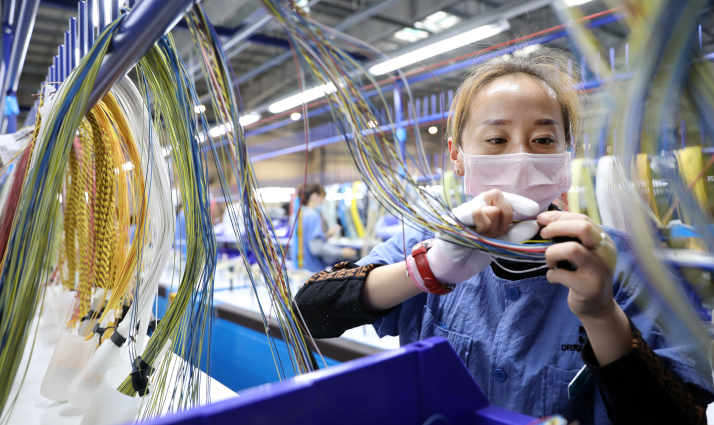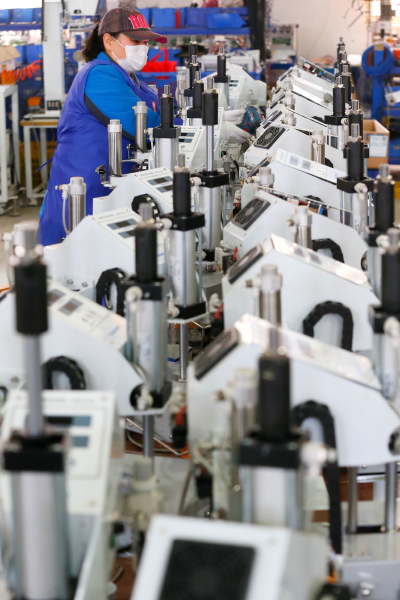|
||||||||||
| Home Nation World Business Opinion Lifestyle ChinAfrica Multimedia Columnists Documents Special Reports |
|
||||||||||
| Home Nation World Business Opinion Lifestyle ChinAfrica Multimedia Columnists Documents Special Reports |
| ChinAfrica |
| Despite economic turmoil caused by the pandemic, foreign investors remain optimistic about Chinese market |
| The rate of work and production resumption in foreign-invested enterprises is steadily rising across China |
| By Ge Lijun VOL.13 June ·2020-06-19 |

Over the last two months or so, the FAW Toyota Motor plant has been bustling with activity. Located in north China's Tianjin Municipality, the plant was built by a Chinese-Japanese joint venture 20 years ago. Despite the current crisis resulting from the COVID-19 pandemic, its 487 Chinese suppliers have all returned to work and resumed production, and the FAW factory's production capacity has been restored to 100 percent. Every day, around 2,000 vehicles are rolling off its production line.
Across the country, the rate of work and production resumption in foreign-invested enterprises is steadily rising. According to a survey by the Ministry of Commerce, as of April 14, 72.8 percent of the 8,700 foreign companies surveyed had a business resumption rate of over 70 percent.
Although the pandemic has had a certain impact on foreign companies operating in China, overall, there has never been and there will never be a large-scale withdrawal of foreign investment from the Chinese market, said Gao Feng, Spokesperson of the Ministry of Commerce. The confidence of foreign investors in their long-term business development in the Chinese market has not been shaken, Gao noted.
"China remains a popular destination for foreign investment," said Gao.

Enhanced confidence
Also according to the Ministry of Commerce, from January to April, the actual utilization of foreign capital nationwide was 286.55 billion yuan ($41.34 billion), a year-on-year decrease of 6.1 percent, as a direct result of the COVID-19 pandemic. However, in April, the utilization of foreign capital domestically amounted to 70.36 billion yuan ($10.14 billion), an increase of 11.8 percent or $10.14 billion year on year.
Since the beginning of the year, China has formulated a series of policies and targeted measures aimed at stabilizing foreign investment and strengthening its promotion and protection, such as the release of 2020 version of industry catalogue encouraging foreign investment to ensure that foreign investments in more fields enjoy taxation and other relevant preferential policies. In early April, the Ministry of Commerce launched 24 measures in order to stabilize foreign investment, including strict and full implementation of the Foreign Investment Law and its implementing regulations, to further improve the level of liberalization and facilitation of investment coming from outside the country.
In addition, at least 24 provinces in China have issued 45 documents focused on stabilizing foreign investment according to their local conditions. Various concrete measures have been taken to support employment and production, and these efforts are constantly being intensified. Key foreign-invested projects have been signed and implemented.
Since the resumption of work on February 10, the production capacity of Tesla's Gigafactory in Shanghai has exceeded the pre-Spring Festival levels. In early May, Tesla China received loans of 4 billion yuan ($564 million) from the Industrial and Commercial Bank of China, a sum that was used to cover only production-related expenses at the Shanghai Gigafactory.
As a result of these loans, the production capacity of Tesla's Model 3 at the Shanghai plant is expected to increase to 4,000 vehicles per week by mid-year. Its annual production capacity is expected to increase to 200,000 vehicles by then.
According to plans published by Tesla, the localization rate for spare parts used in the production of the Model 3 at the Shanghai plant will be increased to 70 percent in July, from 30 percent previously. All spare parts will be produced locally by the end of 2020.
U.S. retail giant Costco also announced that it would open its second store on the Chinese mainland, and Japanese company Toyota Motor announced that it would build a new electric vehicle plant in Tianjin. Starbucks will invest $129 million in Kunshan, east China's Jiangsu Province, to build a coffee roasting plant.
Meng Pu, Chairman of Qualcomm in China, said that Qualcomm's confidence in the company's development in China will not change, and it aims to boost cooperation with Chinese companies in this difficult time. "Qualcomm will further enhance technology cooperation with its Chinese partners in order to bring into full play the advantage of 5G technology in public health management such as curbing the spread of the virus," Meng said in an interview with Xinhua News Agency.
"China quickly brought the outbreak under control within two months and achieved the resumption of work and of the domestic supply chain, which boosted the confidence of foreign investors," Bai Ming, Deputy Director of the International Market Research Department at the Chinese Academy of International Trade and Economic Cooperation of the Ministry of Commerce, told 21st Century Business Herald.
Favorable environment
Exxon Mobil's project in Huizhou, south China's Guangdong Province, passed key approvals in just over a year and was able to start construction.
"Huizhou has a good business environment: transparent and clear policy formulation and implementation, efficient government operations, and strong support for foreign investment and development," said Wan Lifan, President of Exxon Mobil (China) Investment.
In fact, in order to fight the epidemic and ensure the resumption of production and work, China has adopted a series of specific and targeted measures. Chinese and foreign companies are being treated equally, and local governments are helping foreign companies to a large extent in terms of financing and social security, for example by offering rent adjustments, tax exemptions and deferment of payment for related costs.
However, the current global pandemic situation remains a major issue of concern and cross-border direct investment is currently experiencing a serious slowdown. As for China, the foreign investment absorption situation in 2020 is still complicated, and the pressure to stabilize foreign trade and basic foreign investment remains huge, Gao said.
He stressed, however, that the ministry's next steps would be to strengthen service guarantees for major foreign-financed enterprises and projects, implement various policies to stabilize foreign investment, continue to optimize the business environment, increase economic attractiveness and stabilize business. All of these are aimed at further strengthening the long-term confidence of foreign investors in the Chinese market, he added.
(Print Edition Title: Destination of Choice)
Comments to glj@chinafrica.cn
| About Us | Contact Us | Advertise with Us | Subscribe |
| Copyright Beijing Review All rights reserved 京ICP备08005356号-5 京公网安备110102005860号 |